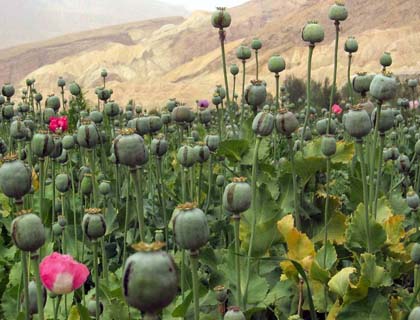KABUL - As a result, the president of the Security Council issued a statement. Illicit drug trafficking remains a significant threat to international peace and stability and Russia is committed to countering this threat on a national and international level.
According to World Drug Report 2013, Afghanistan remains one of the foremost sources for opiates and cannabis resin. The United Nations Office on Drug and Crime states that Afghanistan had increased the area under poppy cultivation by 36 percent from 154,000 hectares in 2012 to 209,000 hectares in 2013. With a crop yield of some 5,500 tons, Afghanistan accounted for up to 80 percent of global opium production. The increase in opium cultivation, trafficking and consumption continues to cause serious harm to the stability, security, social and economic development and governance of Afghanistan, and creates major international problems. It creates fertile ground for terrorism and transnational organized crime, money-laundering, trafficking in illicit drugs and illegal arms to flourish. This situation underlines the need to enhance coordination of efforts at subregional, regional, national and international levels in order to strengthen a global response to this serious challenge and, in particular, to end ties between international terrorism and illicit drugs.
Russia has put a lot of effort into the Financial Action Task Force (FATF), identifying illicit financial flows linked to Afghan drug production and trafficking. The country also trains Afghan law enforcement officers on combating illicit drugs at the Domodedovo Police Academy of Russia.
Russia welcomes the efforts of the government of Afghanistan in fighting drug production. At the same time, Kabul should make this fight its top priority. The Afghan government has been tasked, with the assistance of the international community, to accelerate the implementation of the National Drug Control Strategy, and this includes alternative livelihood programs. Russia also calls on the International Security Assistance Force (ISAF) to further effectively support, within its designated responsibilities, Afghan-led sustained efforts to address drug production and trafficking, in cooperation with relevant international and regional agencies. Unfortunately, at this stage the ISAF is not doing enough in this regard.
It is highly important to combine the efforts of the existing regional and international cooperation and coordination mechanisms, in order to develop an integrated, comprehensive and balanced response to the drug problem, as part of a long-term security, development and institution-building agenda. The continued commitment of international organizations, including the Shanghai Cooperation Organization and the Collective Security Treaty Organization will go a long way to helping the situation.
Russia underlines the importance of the counter-narcotics issue for the United Nations’ engagement in Afghanistan, and a priority element of a common strategy to build a stable, safe and prosperous country. (Reuters)

